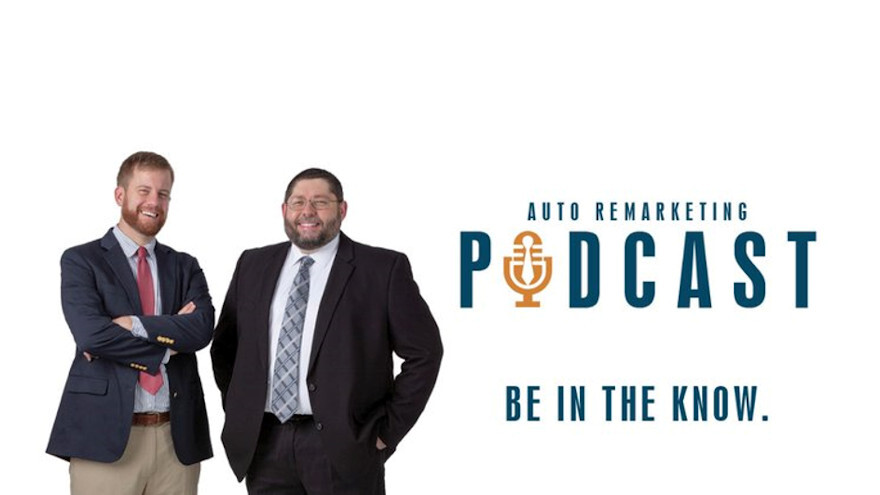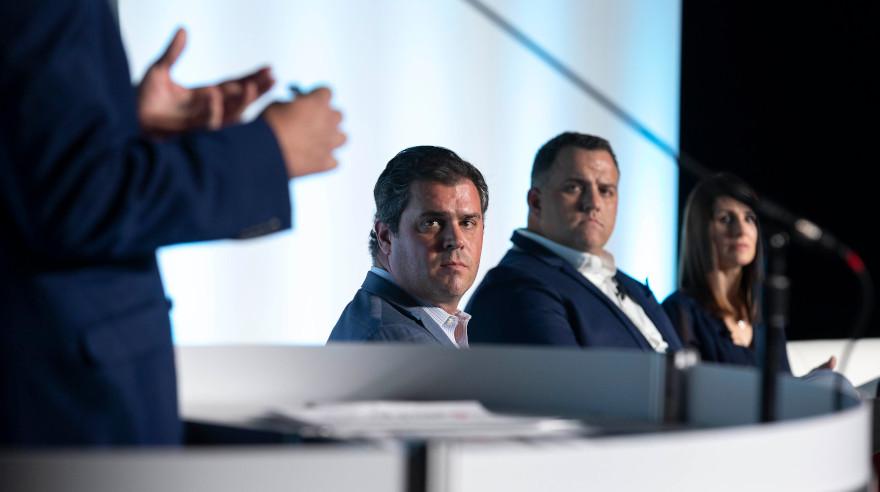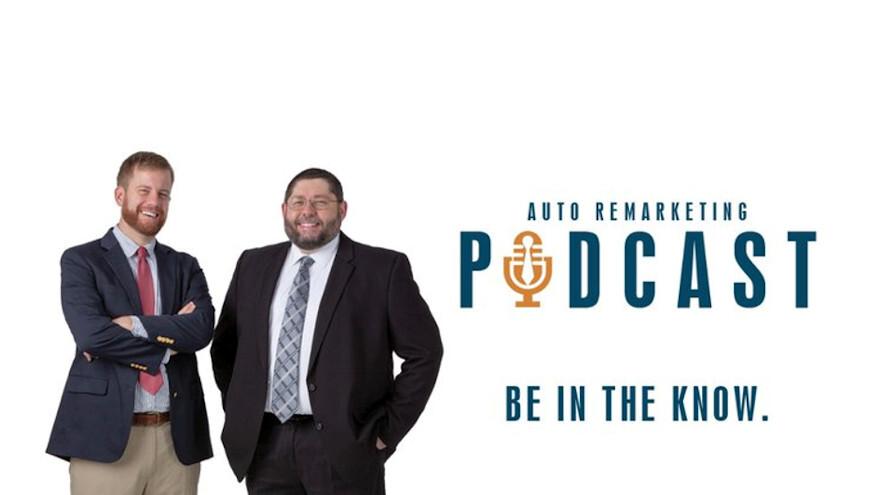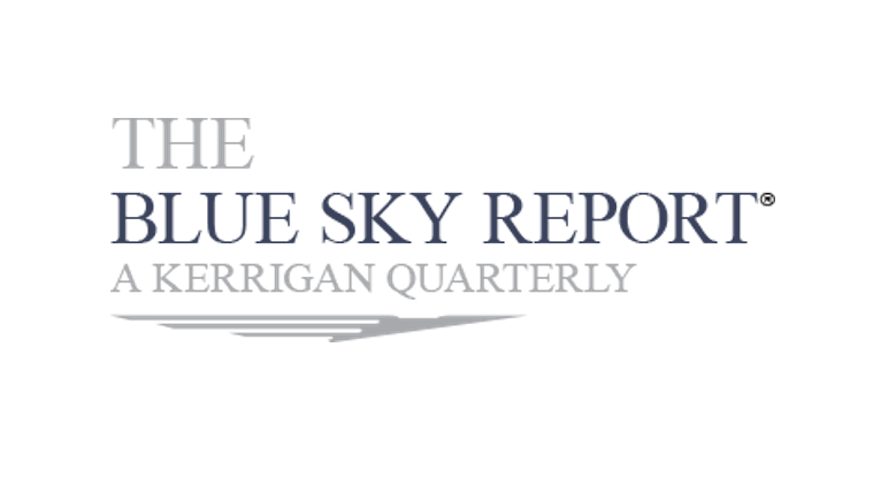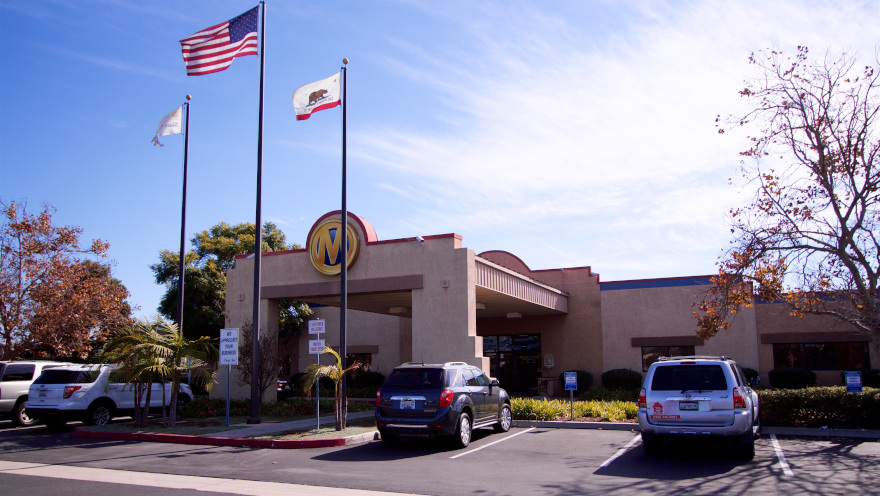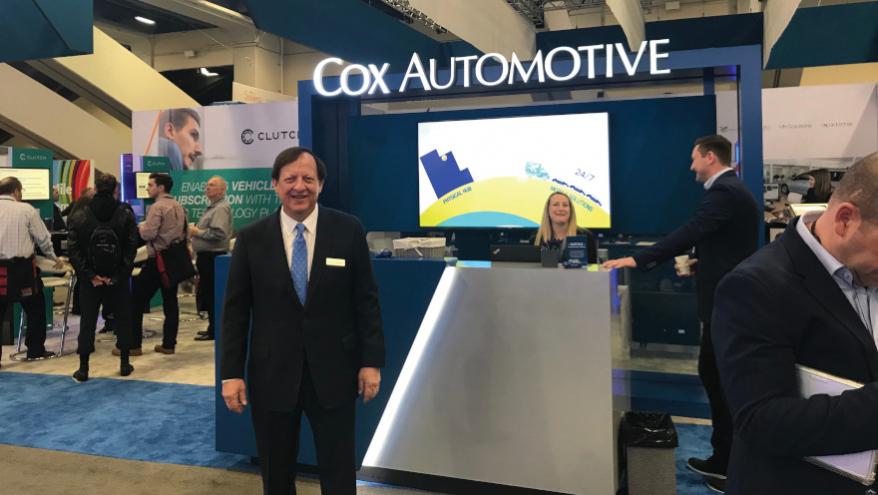Brian Skutta, the president of automotive at Spireon, discussed two topics that probably are top of mind at dealerships nowadays.
In this episode of the Auto Remarketing Podcast, Skutta described the progress dealerships are making toward more availability of touchless vehicle delivery while at the same time keeping their service drive busy, even if drivers aren’t on the roads as much as before the coronavirus pandemic arrived.
To listen to this episode, click on the link available below, or visit the Auto Remarketing Podcast page.
Download and subscribe to the Auto Remarketing Podcast on iTunes or on Google Play.
On the surface, launching an initial public offering during a pandemic, with entire markets and industries only just beginning to restart, may seem like a head-scratcher.
But for an ecommerce company in an asset-heavy, traditionally brick-and-mortar-based industry like automotive retail, it might make total sense.
It did for Vroom this week.
On Monday, the online auto retailer announced the 21.25 million shares of its common stock in the IPO were being priced at $22 per share.
Those shares started trading on the Nasdaq Global Select Market on Tuesday and closed at $47.90 per share. Wednesday, they closed at $49.99 per share.
'Exciting and unusual' & all-digital
Auto Remarketing caught up with Vroom chief financial officer Dave Jones by phone on Tuesday just before the market closed.
“It’s been exciting,” he said of the whirlwind IPO process, adding with a laugh: “And unusual.”
In fact, the whole process was digital — which is actually kind of appropriate, given Vroom’s ecommerce model.
Everything from “testing the waters” and meetings to the road show and the market bell-ringing Tuesday was virtual, Jones said.
Beyond those unique all-digital steps, you might expect that an IPO during a pandemic would have challenges that a company might not face otherwise. But for Vroom, it actually pushed up the offering’s timeline.
“It’s interesting. The pandemic has actually accelerated everything for us. So, we really saw this as kind of an opportunistic time to get out into the public market. The recognition, I think, of our business model is accelerating,” Jones said.
He points to a Cox Automotive study indicating consumer openness to buying a car online nearly doubling from pre-COVID levels to post-COVID levels.
Such acceptance of online car-buying presented a “unique opportunity for our model,” Jones said.
“Carvana’s been having tremendous success in their business,” he said, citing Vroom’s competitor that went public in 2017. “In fact, in the middle of the pandemic, March and April wound up being the two highest-selling ecommerce months in our history. So, we’ve leaned into this.
“Now, having said that, in mid-March we saw the slowdown in demand in our data — which, we’re really driven by data — and when we started to see that, we made a very conscious decision to try and reduce our exposure to inventory,” Jones said.
That process, he said, began in mid-March lasted three quarters of the way through April.
“And then we saw the data telling us that demand was picking up, prices were stabilizing — albeit at a much lower level. So, we were certainly glad that we had sold through the inventory that we had,” Jones said.
“We got back into the market again and started acquiring pretty aggressively at really favorable prices today. So, I think the sell down of the inventory was a smart idea. We still did it profitably,” he said. “We were still able to have a pretty good gross margin on all those vehicles that we sold. It gave us a lot of confidence in the model that we’re able to pivot and react to the market pretty aggressively.”
Decision on timing
A potential IPO has long been something Vroom has considered.
Things began to get in motion late last year.
The company filed a confidential S-1 registration statement with the Securities and Exchange Commission in December, Jones said, and had planned the IPO for the summer.
“And then, literally, it’s probably four weeks ago, we’ve got some pretty sophisticated inventors, legacy investors, and so in conversations with them, we started to realize that this was a real opportunity for us and that it may be an opportunity to pull it forward and take advantage of some of the love we’re getting in the consumer market in our retail business to say … maybe that’s advantageous for us as well in the capital markets,” Jones said.
“So, that’s really what drove the decision. We were on the path anyway and it was just an opportunistic move on timing.”
In this episode of the Auto Remarketing Podcast, Cherokee Media Group president Bill Zadeits chats with John Mathiowetz of IAA.
They talk about how IAA has weathered the pandemic, the acceleration of the transition to IAA's 100% digital platform, IAA's marshaling services during the pandemic, views of the wholesale market and more.
To listen to this episode, click on the link available below or visit the Auto Remarketing Podcast page.
Download and subscribe to the Auto Remarketing Podcast on iTunes or on Google Play.
Dawn Walston is vice president and general manager of Titus-Will Toyota in Tacoma, Wash., which is part of the Titus-Will Automotive Group.
She joins the Auto Remarketing Podcast to discuss how her dealership and group has navigated the COVID-19 pandemic in one of the hardest-hit areas of the country.
To listen to this episode, click on the link available below, or visit the Auto Remarketing Podcast page.
Download and subscribe to the Auto Remarketing Podcast on iTunes or on Google Play.
Vehicle sales aren’t the only retail category to drop because of the COVID-19 pandemic. Kerrigan Advisors’ first quarter 2020 Blue Sky Report outlined the decline of the dealership buy/sell market impacted by the same trigger.
Kerrigan Advisors reported this week that Q1 activity fell by 9.3% year-over-year. The firm indicated transactions slated to close at the end of the quarter were postponed, renegotiated or, in the worst case, terminated.
However, the report indicated that blue sky values are not dramatically impacted and, with auto sales due for an uptick, a buy/sell rebound in the second half of this year is anticipated.
Kerrigan Advisors acknowledged a bright start to the year was not enough to avoid severe financial whiplash as U.S. dealerships shuttered in mid-March and consumers were told to stay home. As a result, sales plummeted in March and April, resulting in one of the sharpest declines in dealership earnings on record, and the buy/sell market followed suit.
Kerrigan Advisors is expecting the second quarter to be the slowest buy/sell market in recent history.
“As a result of the coronavirus, auto dealers had to refocus their energy on internal operations and cash preservation in March and April,” said Erin Kerrigan, founder and managing director of Kerrigan Advisors. “And while, at present, the industry is still managing through the economic effects of the health crisis, we see better days ahead thanks to the resilience of the dealer model that’s likely to thrive as dealerships reopen.
“In fact, with industry cost cuts and improved efficiencies, we expect auto retail will see significant improvements in profitability, making more money on less revenue, in the second half of 2020,” Kerrigan continued in a news release.
Given strong buyer demand and today’s low cost of capital, The Blue Sky Report by Kerrigan Advisors does not forecast dramatic changes in blue sky values in the foreseeable future, despite the economic impact of COVID-19 in the first and second quarter.
Once again, the firm asserted that many dealers have shown the ability to maintain profits, even during the worst of times. “In the depths of the Great Recession, auto retailers remained profitable,” report authors said, “and sellers choose to patiently wait for a buyer to reach their valuation expectations, rather than sell at a discounted valuation.”
Kerrigan Advisors explained this situation means that the most likely impact of COVID-19 will be a slower buy/sell market in the second quarter of this year, rather than a decline in dealership valuations.
As vehicles sales rise and buyers seek to put a substantial amount of capital to work, the report indicated potential for a rebound in buy/sell activity in the second half of the year and noted that the capital markets are experiencing a surge in auto retail valuations.
Since bottoming on March 18, The Kerrigan Index has risen 81.2% through the end of May. Also, the firm pointed out the industry is seeing improved profits from an increased utilization of technology to cut costs as digital retailing becomes the order of the day.
“While the coronavirus will undoubtedly force some distressed dealership sales, those one-off valuations are not a reflection of the overall market,” said Ryan Kerrigan, managing director of Kerrigan Advisors. “In fact, while this global health crisis is impacting auto retail in many different ways, industry partners, vendors, lenders and OEMS have provided dealers with tremendous financial and administrative support to ensure they weather the financial impact of lost sales and avoid closure.
“And, auto retailers have the most flexible cost structures within the supply chain, so they are best able to adjust to unforeseen events,” Ryan Kerrigan continued. “Given that, the health crisis has caused few distressed transactions.”
Kerrigan Advisors made one valuation upgrade in its latest Blue Sky Report, increasing Toyota’s low-end multiple from 5.25 to 5.5. The firm noted this increase reflects rising buyer demand for one of the highest quality franchises in the market and a belief that Toyota is best prepared amongst all OEMs to weather the economic impact of COVID-19.
“Toyota had one of the lowest sales declines in the first quarter of any franchise and maintains the highest credit rating of the OEMs,” Erin Kerrigan said. “With a flight to quality assets, Toyota franchises are expected to command even higher multiples as buyers seek safe investments during the pandemic.”
Kerrigan Advisors identified the following three trends, which are expected to meaningfully impact the buy/sell market for the remainder of the year, including.
• Sellers’ blue sky pricing expectations exclude COVID-19 financial impact
• Surge in buyer/investor demand due to industry growth prospects and low cost of capital
• Buy/sell activity by state diverges based on level of economic shutdown
Other highlights from the Q1 report by Kerrigan Advisors include:
• Prior to COVID-19, dealership earnings through February were on track for a 38.7% increase over 2019 and near 2015’s record level.
• First quarter buy/sell activity declined 9.3%, with 49 transactions closing compared to 54 transactions during the first quarter of 2019, according to The Banks Report, Automotive News and Kerrigan Advisors’ research.
• The first quarter saw a high level (31%) of multi-dealership transactions.
• Among the franchises being acquired, domestics continued to dominate in the first quarter of 2020, representing 57% of buy/sells, up 84% since 2015. Domestic dealership buy/sell market share is now consistent with franchise market share. Kerrigan Advisors expects domestics to dominate the 2020 buy/sell market, as multi-generation dealer families decide to sell post-pandemic. Additionally, import luxury’s buy/sell market share increased in the first quarter to 18%, up 12.5% over last year.
• The public auto retailers’ spending on U.S. dealership acquisitions in the first quarter increased 11.5%, compared to the first quarter of last year. The publics were expected to spend over $1 billion on acquisitions in the first quarter with Asbury Automotive Group’s acquisition of Park Place Dealerships.
• Asbury Automotive Group terminated the Park Place acquisition on March 24. The company’s market capitalization declined 51.6% from the time of its announcement of the Park Place Dealerships acquisition in December to the time of the transaction termination.
• Kerrigan Advisors expects the second quarter of 2020 to be the slowest buy/sell market in recent history due to pandemic stay-at-home orders.
• Kerrigan Advisors upgraded Toyota’s low-end blue sky multiple from 5.25 to 5.5 and downgraded Ford’s low-end blue sky multiple, Buick GMC’s high-end and low-end multiples, and Nissan’s low-end and high-end blue sky multiples.
The complete Blue Sky Report published by Kerrigan Advisors and other firm services can be found on this website.
Amid the recovery in the overall used-vehicle retail market, the certified pre-owned segment was an especially bright spot in May.
According to a Cox Automotive analysis of data from Motor Intelligence, there were 237,495 CPO sales for the month.
While that’s down 6% from May 2019, last month’s certified sales tally is 87% stronger than April’s, Cox said.
What’s more, that year-over-year decline in May is a substantial improvement over the 46% year-over-year decrease in April. In March, certified sales were down 40% year-over-year, according to the Cox analysis of Motor Intelligence data.
That followed what was another record start to the year.
The first month of 2020 was the strongest January for the certified pre-owned market in a decade, according to a previous report from Cox covered in Auto Remarketing. February then beat those sales by 10%.
Year-to-date sales CPO are at 977,333 units, a 16% decrease, according to latest analysis.
More than two-fifths (44%) of those sales are from Toyota, Honda, Chevrolet, Ford or Nissan, Cox said. A third come from Toyota, Honda or Chevrolet, with those brands representing the largest players in the CPO market, according to the analysis.
Overall used-car sales
There was a 22.4% year-over-year decrease in overall used-vehicle sales for May, with new-car sales falling 30%, Cox Automotive said.
The company estimated the overall used-vehicle SAAR for the month at 32.0 million. In May 2019, it was 39.2 million, and in April, it was 27 million
What Cox considers to be the retail used-vehicle SAAR (or sales by franchised and independent dealers only) was at an estimated 16.7 million last month. In May 2019, it was 21.0 million. In April, it reached 14.4 million.
“Overall, used-vehicle demand continues to improve, which has helped stabilize wholesale vehicle prices and reduce the excess supply of used vehicles,” Cox said in the report. “The wholesale used-vehicle supply peaked at 149 days on April 9, when normal supply is 23. It was down to 39 days by the end of May.”
Over at J.D. Power, analysts were noticing similar trends. In a webinar Thursday on the weekly J.D. Power Auto Industry Impact Report, analyst Larry Dixon said: “Used-vehicle sales at franchised dealers have been robust for several weeks now. May closed with used retail sales down just 5% from our pre-virus forecast for the month or 15 percentage points better than new-vehicle sales.
“Sales in several major markets have especially strong, including Dallas, Phoenix, Cleveland, Denver and Tampa,” said Dixon, who is senior director at J.D. Power Valuation Services.
“Dealers in these markets will need to replenish used retail inventory, which will in turn, help support wholesale auction activity and wholesale prices,” he said.
In comments included in an emailed summary of the report’s highlights, J.D. Power vice president of data and analytics Tyson Jominy wrote: “The strong demand for used vehicles is consistent with prior periods of challenging economic conditions.
“Less compelling incentives on new vehicles will further bolster demand for used vehicles and a significant number of households who would have purchased a new vehicle are switching to the used market due to affordability concerns,” Jominy said. “Reduced new-vehicle incentives will also remove a headwind to the maintenance of strong used-vehicle wholesale and retail prices.”
Both Black Book and Cox Automotive released their monthly wholesale indices for May in recent days, each remarking how some stabilization arrived in the space when compared to the COVID-19 induced turbulence seen in April.
Cox Automotive reported wholesale used-vehicle prices (on a mix-, mileage-, and seasonally adjusted basis) increased 8.96% month-over-month in May; a movement that brought the Manheim Used Vehicle Value Index to 137.0, a 1.9% decrease from a year ago.
Over at Black Book, analysts there said their Used Vehicle Retention Index for May came in at 106.0, marking a 0.7-point dip from April’s reading of 106.7.
Cox Automotive analysts explained Manheim Market Report (MMR) prices improved over the last four weeks, resulting in a 5.1% cumulative increase.
Analysts also noticed MMR Retention — which they explained to be the average difference in price relative to current MMR — was greater than 100% in all but three days in May and averaged 101.7% for the month.
“The MMR Retention trend reflected that vehicles were selling above current MMR values and was a clear reversal of what happened in late March and April,” Cox Automotive said in its report that accompanied the latest Manheim index update.
On a year-over-year basis, Cox Automotive determined each of the major market segments saw seasonally adjusted price declines in May. Minivans led the way with a drop of 8.3%, followed by midsize cars (down 7.4%) and compact cars (6.9%).
Analysts said pickup prices slid 4.1% while prices for SUVs and CUVs mimicked the overall reading at 1.9%. Only luxury vehicles softened less than the overall reading as prices for those units edged down by 0.6%.
Cox Automotive also mentioned pricing for rental-risk vehicles.
Analysts determined the average price for rental risk units sold at auction in May was down 5.3% year-over-year but were up 6.4% compared to April.
Cox Automotive added that the average mileage for rental risk units in May (at 46,300 miles) rose 2% compared to a year ago but declined 10% month-over-month.
More details about Black Book index
As mentioned previously Black Book reported its May Used Vehicle Retention Index for May registered in at 106.0.
“After a record drop in wholesale prices in April, we saw the markets stabilize in the second part of May,” Black Book senior vice president of data science Alex Yurchenko said in a news release.
“Both the truck/SUV and car segments depreciated in May, but at much lower rate. Due to changing economic conditions and the expected glut of used inventory, we project a drop in values over the summer months,” Yurchenko continued.
The Black Book Used Vehicle Retention Index is calculated using Black Book’s published wholesale average value on 2- to 6-year-old used vehicles, as percent of original typically equipped MSRP. It is weighted based on registration volume and adjusted for seasonality, vehicle age, mileage and condition.
The index goes back to January 2005 when Black Book published a benchmark index value of 100.0 for the market. During 2008, the index dropped by 14.1% while during 2016, the index fell by just 6.4%.
During 2011, the index rose strongly from 113.3 to 123.0 by the end of the year as the economy picked up steam and used-vehicle values rose higher. It continued to remain relatively stable, rising slightly until May of 2014 when it hit a peak of 128.1.
To obtain a copy of the latest Black Book Wholesale Value Index, go to this website.
Manheim is allowing consignor representatives back on the auction block this week to rep their vehicles during sales, which remain in Simulcast-only mode.
The auction company is also looking at ways to safely bring bidders back to the auction arena and could be piloting those plans at locations towards the end of June.
These updates were shared during a wide-ranging interview Friday with Manheim president Grace Huang and Patrick Brennan, who is senior vice president of Manheim Marketplace.
As far as the seller reps returning to the auction arenas, Manheim is “looking to do this broadly,” throughout its locations, Brennan said. Only one consignor rep will be allowed on an auction block with the auctioneer and there will be various safety protocols, social distancing and plexiglass barriers, he said.
In terms of bringing bidders back to the auction arena, Brennan said: “We’re probably going to be putting some plans together really centered on and led by safety and social distancing and masks and all sorts of other safety protocols. We want to make sure that we can follow, our team members can follow and our dealers can follow (those measures). And we’re probably going to put some pilot locations out there near the end of the month and explore what that looks like.
“That one’s going to be a tough one. We’ve certainly seen this industry for many many years not be able to social distance and follow those types of things — not that we needed to, back then, per se,” Brennan said.
“But it’s going to be very important, based on some of the things we’ve seen in the industry that’s taken place here in the last few weeks to make sure that we do this in the right manner,” he said. “We’re asking for a little bit more patience from our dealers, but we think we’ll be moving in that direction as the summer rolls along here, as we learn a little bit more about it.”
Things could return to “some level of normalcy” as the market gets into summer, Brennan added. But Manheim’s decision-making on those matters will be “really intentional and methodical,” he said.
Huang describes a “safety-first” mentality throughout that Manheim and Cox Enterprises at large and emphasized that decisions will be based on data.
“We are being very, very methodical about how we do these things. And we’re looking a lot to the CDC, the pandemic levels and data, to make sure that when we bring people back, when we open up a location that the data supports it,” Huang said. “Because our No. 1 priority is safety and the Cox family has been incredibly supportive. They will give up profits for safety. And they have.”
Manheim is still sorting out its playbook, so to speak, and it has to be nimble, Huang said, as conditions change. The auction company must pay attention to hot spots, she said. Even if they open an auction back up, they could have to close it if conditions merit.
“We’re going to be following the data and the CDC guidelines and really use that as our anchor of how we make our decisions,” Huang said.
In an update letter posted Tuesday, Huang said of the planned in-lane bidding pilot: “This change will require strict protocols, including redesigned auction blocks with Plexiglas guards, new distancing requirements and enhanced safety measures. Should social distancing violations occur, or we experience a rise in COVID-19 hot spots, this pilot program will be suspended.”
Manheim began allowing dealers back to the auction lots for inventory previews a few weeks ago and started bringing back some of its furloughed employees on June 1.
Manheim said it plans on opening additional lots for inventory previews, as allowed by ordinances.
“Today, more than 90% of our sites offer expanded viewing days and times, and clients continue to tell us this is helping them drive greater sales results,” Huang said in Tuesday's letter.
Another change the company announced Tuesday was that it was, “Organizing vehicles as space permits, with increasing sales freeing up capacity to stage more vehicles,” Huang said in the letter.
It has been running in digital-only mode throughout the COVID-19 pandemic. Manheim recently sold close to 20,000 vehicles in a day through Simulcast, breaking a record, Huang said.
The year began with Manheim selling 51% of its vehicles to digital buyers in January, and during the pandemic, it has been “leaning into its existing digital strategy,” according to initiatives outlined in “The Way Forward” plan from parent company Cox Automotive.
Sandy Schwartz, Cox Automotive’s president and chief executive officer, spoke to Auto Remarketing on Thursday about that plan for an episode of the Auto Remarketing Podcast (which can be found below), including the plan to “accelerate digital adoption” both on the wholesale and retail sides of its business.
Auto Remarketing asked Schwartz what the ideal scenario would be for Manheim to return to traditional, physical auction sales.
“No. 1, we are not going to do anything that puts our employees or our partners in harm’s way,” Schwartz said, adding that he and Manheim leadership are on the same page regarding that priority.
“We are just not going to open a lane and let people walk all over each other and get really close to each other as long as this pandemic is out there,” Schwartz said. “If there’s a vaccine or whatever, herd immunity, I’m not a scientist or a doctor, so I can’t describe what that looks like, but we are not going to do that if it’s not safe for everybody involved.
“When we do do that someday — and I do believe there might be some cars that really do need to go through a lane — we’re going to have to be able to do it in an orderly way, a safe way and someone’s going to have to tell everybody out there that it’s safe to be around people,” he said.
Schwartz emphasized that “we are going to have to be convinced that it’s a safe environment, and then also, it’s needed.”
But he is not saying that cars won’t ever run through the lane again.
“I’m not going to tell you that all of a sudden, I see the light and I don’t think any cars should go through the lane, because there may be cars that need to go through a lane,” Schwartz said. “But we’re only going to do it if we don’t compromise safety on both ends of this … that’s really important to us.”
Hear more from Schwartz in Monday’s episode of the Auto Remarketing Podcast, where he discusses “The Way Forward” plan from Cox Automotive.
Cox Automotive president and chief executive officer Sandy Schwartz was set to send a letter Monday to many of the company’s clients and partners on a strategic plan called “The Way Forward.”
Auto Remarketing caught up with Schwartz by phone on Thursday to discuss the three-point plan, the details of which can be found in the episode of the Auto Remarketing Podcast below.
“Our best minds have been imagining the ‘next normal’,” Schwartz said in the letter, “and we’re beginning to see what will be necessary to thrive post-pandemic — a collection of new and updated strategies we’re calling The Way Forward. The goal is the same as it has always been: to sell more cars, more efficiently than ever before. And our pledge to help you do that has never been stronger.”
The three elements of the plan include the following steps: accelerating digital adoption both in retail and in wholesale, providing real-time market insights and being “human at your core,” the company said.
To listen to this episode, click on the link available below, or visit the Auto Remarketing Podcast page.
Download and subscribe to the Auto Remarketing Podcast on iTunes or on Google Play.
Industry organizations like the National Independent Automobile Dealers Association and the National Association of Federally-Insured Credit Unions (NAFCU) cheered Congress for passing a measure that President Trump signed on Friday morning.
The associations recapped that a bipartisan bill that would give small businesses like dealerships more time to use the funds from Paycheck Protection Program loans, as well as other updates to the program, was passed by the Senate in a unanimous voice vote on Wednesday night.
The Paycheck Protection Program Flexibility Act, sponsored by Rep. Chip Roy (R-Texas) and Rep. Dean Phillips (D-Minn.), had previously been passed by the House of Representatives in a 417-1 vote.
Trump then signed the act into law on Friday soon after the latest jobs report arrived from the U.S. Bureau of Labor Statistics that showed unemployed dropped in May.
NIADA explained the new law addresses concerns with the Small Business Administration’s forgivable PPP loans, which require businesses to use the money within eight weeks of receiving it to be eligible for full forgiveness.
But because many businesses were shut down for months by government orders, they didn’t have the time to do what was necessary to have their loans forgiven in that short span.
Roy and Phillips said the PPP Flexibility Act is intended to make it more feasible for businesses to qualify for forgiveness.
In addition to extending the time in which the loan funds must be used to qualify for full forgiveness from eight weeks to 24 weeks — through Dec. 31 — it would also reduce the percentage of PPP funds required to be used for payroll from 75 percent to 60 percent.
“NIADA is proud and encouraged to see members of both parties in Congress come together and act quickly to solve this problem,” NIADA chief executive officer Steve Jordan said in a news release distributed ahead of Trump’s signing.
“This bill provides much-needed flexibility to NIADA members and small businesses across the nation as they reopen and rehire staff,” Jordan continued. “Economic recovery from a crisis like COVID-19 takes time, and this gives independent dealers the time they need to get their operations back up to full speed.”
Other provisions include eliminating the restriction limiting loan terms to two years, allowing businesses that receive PPP loans to also defer payroll taxes, and extending the deadline to rehire employees from June 30 to Dec. 31 to account for the effect of federally enhanced unemployment benefits.
“NAFCU applauds Congress’ efforts to ensure the PPP works for small businesses, and this bill provides business owners with flexibility to use the program’s funds over an extended period of time,” NAFCU president and CEO Dan Berger said in a statement released before the signing. “As the coronavirus crisis evolves, small businesses are adjusting their plans daily. These reforms will allow each to make the strategic decisions that are best for their business and employees amid uncertainty and economic hardship.
“We thank lawmakers for sending this important bill to President Trump’s desk for signature, and NAFCU looks forward to continuing to work with Congress on future coronavirus relief reforms,” Berger added.
The deadline for applying to receive a PPP loan remains June 30.
The PPP, created by the CARES Act in late March, allotted $349 million in funding for forgivable loans of up to $10 million per borrower to help small businesses weather the COVID-19 crisis. After those funds were distributed in less than two weeks, Congress approved an additional $310 billion on April 21.
The latest moves by Congress also coincides with what the Consumer Bankers Association (CBA) and Bank Policy Institute called on lawmakers to do ahead of Wednesday night’s vote.
Those two organizations asked for legislation to pass that would automatically forge Paycheck Protection Program loans of $150,000 and less. Approximately 85% of all PPP loans would be eligible for this automatic forgiveness, according to their estimates.
CBA and the Bank Policy Institute went on to note that requiring the 3.7 million eligible PPP recipients in this category to simply verify funds were used in accordance with program guidelines, instead of completing lengthy forgiveness forms released by the Small Business Administration, would collectively save up to 70 million hours of paperwork for small business owners and approximately $7.4 billion, which could be allocated to reopening costs and other business measures.
“These small businesses and their employees are the backbone of our nation’s economy and communities. Their time and resources would be better focused on getting the economy safely back up and running, not processing burdensome paperwork,” the organizations said.
While the act might lessen the paperwork burden on businesses, Sen. Jack Reed, a Rhode Island Democrat, wants more measures put in place to make sure the PPP program functions correctly.
“This was a critical step toward revamping the Paycheck Protection Program,” Reed said in a statement. “It will help provide small businesses with increased certainty and flexibility to cover necessary costs like rent. But Congress and the administration still have a lot of work to do to get this program working properly and get our economy working again. There has to be meaningful accountability and oversight of PPP and sustained, bipartisan commitment to broad-based economic recovery
“There should be a public audit of PPP so the American people can see where their money is going and who it is going to,” he continued. “Right now, the Trump administration is keeping that information to itself which could result in abuse of the program. There needs to sunlight and oversight to ensure PPP works properly for taxpayers.”

